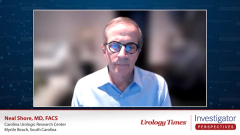
Ongoing Research in BCG-Unresponsive NMIBC
Neal Shore, MD, FACS, reviews agents and treatment options being researched in the BCG-unresponsive NMIBC treatment space.
Episodes in this series

This is a video synopsis/summary of an Investigator Perspectives featuring Neal Shore, MD, FACS.
Dr Shore discusses exciting recent advances for bacillus Calmette-Guérin (BCG)–unresponsive high-risk non–muscle-invasive bladder cancer (NMIBC). An oral agent called erdafitinib was FDA approved in 2019 for metastatic urothelial cancer. The THOR trial studied erdafitinib for BCG-unresponsive high-risk NMIBC and found higher complete response rates vs chemotherapy. However, erdafitinib requires intensive monitoring for hyperphosphatemia, ocular changes, gastrointestinal issues, and other adverse events.
Another promising approach is using an intravesical device like TAR-200 to deliver erdafitinib directly into the bladder. FGFR gene alterations are more common in NMIBC (50%-70%) vs metastatic disease (25%-30%), offering rationale.
The KEYNOTE-057 trial led to FDA approval of pembrolizumab for BCG-unresponsive carcinoma in situ (CIS), with 41% complete response at 3 months and approximately 19% at 1 year. Longer follow-up shows most responders avoid cystectomy without developing metastases. Nadofaragene firadenovec was also recently approved for BCG-unresponsive CIS, given intravesically every 3 months. The QUILT study combined BCG with ALT-803, an interleukin-15 superagonist, for BCG-unresponsive CIS and found more than 70% complete response at 3 months and sustained benefit at 1 year.
Video synopsis is AI-generated and reviewed by Urology Times® editorial staff.
Newsletter
Stay current with the latest urology news and practice-changing insights — sign up now for the essential updates every urologist needs.







